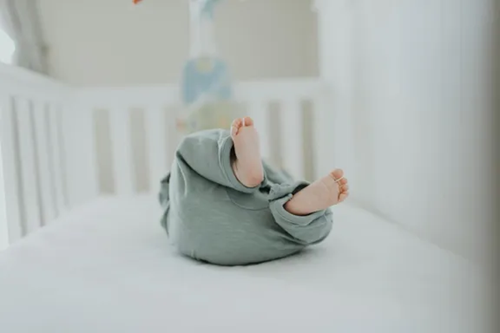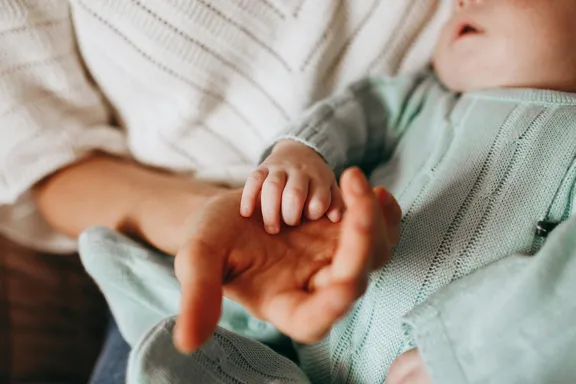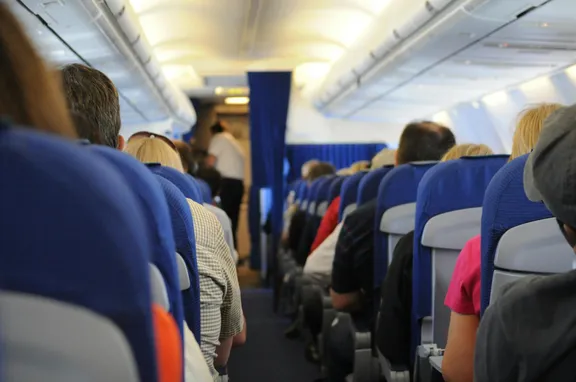
When a man demanded I leave my airplane seat because my granddaughter wouldn’t stop crying, I gathered my belongings, tears streaming down my face. But then, a teenage boy offered me his business-class seat—and what happened next left the cruel man completely pale.
I am 65 years old. The past year has been a blur of grief, sleepless nights, and constant worry. My daughter died shortly after giving birth to her daughter. She fought valiantly during delivery, but her body could not hold on.
In just a few hours, I went from being a mother of a healthy adult daughter to the sole guardian of a newborn. And my son-in-law, Lily’s father, could not cope. I saw him once in the hospital, holding his daughter, whispering something I couldn’t hear, then gently placing her back in the bassinet. His hands shook. The next morning, he was gone. No funeral arrangements. No homecoming for his child. Just a handwritten note: “I’m not cut out for this life. You’ll know what to do.” That was the last time I saw him.
And so, Lily became mine. My responsibility. The only parent she had. The first time I whispered her name aloud after my daughter’s funeral, I broke down crying. My daughter had chosen it herself—simple, sweet, strong—everything she hoped her little girl would become. And now, every night, as I rock Lily in the quiet hours, whispering her name into the darkness, it feels like I am speaking my daughter’s voice back into the world.
Raising Lily has been exhausting. Babies are expensive, and money disappears faster than I can count. I stretch my pension, take odd jobs, babysit neighbors’ children, help at the local food pantry in exchange for groceries. Some nights, after finally settling her in her crib, I sit at my kitchen table, staring at bills, wondering how I’ll make it through another month. But then she stirs, opening her wide, curious eyes, making soft baby sounds. And in those moments, my heart remembers why I keep going. She lost her mother. Her father abandoned her. She deserves at least one person in this world who will never leave her.
So when my oldest friend, Carol, called from across the country, urging me to visit for a week, I hesitated. “Margaret, you need a break,” she said firmly. “Bring Lily. I’ll help with everything. Night feedings, meals… just rest.” The idea of rest felt impossible, yet Carol was right. I was running on empty.

I scraped together enough for a budget airline ticket. It wasn’t much—cramped seats, limited comfort—but it would get us there. As soon as we settled into our narrow economy seats near the back, Lily began to fuss. At first, a soft whimper—but within minutes, full-blown crying. I tried everything: rocking, whispering, feeding, diaper checks—but nothing helped.
Heads turned. A woman in front sighed. A man two rows ahead glared at me. My hands shook as I hummed a lullaby my daughter had loved. The air felt thick with judgment. And then the man beside me lost patience.
“For God’s sake, can you shut that baby up?” he barked, loud enough for several rows. “I paid good money for this seat. If you can’t control her, move—go stand with the flight attendants or lock yourself in the bathroom. Anywhere but here!”
I froze. Tears welled up. “I’m trying,” I stammered. “She’s just a baby. I’m doing my best.”
“Well, your best isn’t good enough!” he spat. “Get up. Now.”

I gathered Lily and our diaper bag, legs trembling. “I’m so sorry,” I whispered. I was ready to retreat to the back, humiliated and defeated—until a gentle voice stopped me.
“Ma’am?”
I turned. A teenage boy, no older than sixteen, stood a few rows ahead. “Please wait. You don’t have to go to the back.”
In that instant, Lily’s cries softened, then stopped. The silence was astonishing. The boy smiled faintly. “She’s just tired. She needs a calmer place,” he said, holding out a boarding pass. “I’m in business class with my parents. Please take my seat.”
I shook my head. “I can’t—”
“No, really. They’ll understand. You and the baby need this.”
I nodded, clutching Lily. The boy’s parents greeted me warmly, offering pillows, blankets, and reassurance. I sank into the wide leather seat, overwhelmed. Lily sighed, closed her eyes, and for the first time on the flight, relaxed. I fed her. She drank peacefully. Tears streamed down my cheeks—this time from relief and gratitude.

Meanwhile, the boy quietly returned to economy, taking my old seat—beside the man who had shouted at me. The man’s face initially lit with satisfaction, but then it drained. The boy was his boss’s son.
“My parents taught me that how you treat people when no one important is watching shows your true character,” the boy said quietly. “What I saw told me all I need to know about yours.”
The man’s smile faltered. His voice cracked. His silence stretched painfully through the rest of the flight. Later, I learned his cruelty cost him his job.
I didn’t celebrate. I simply felt justice. Quiet, undeniable justice. On that flight, cruelty and kindness were laid bare. One man’s arrogance could ruin a life—or his own. One boy’s compassion restored hope.
For years, I’d felt invisible—an old woman barely scraping by, raising a baby who had lost too much. Humiliation nearly broke me that day. But one act of kindness lifted me, reminded me of my worth, and proved that goodness still exists in this world. Lily may never remember that day, but I will carry it with me forever. One act of cruelty can hurt—but one act of kindness can change everything.


